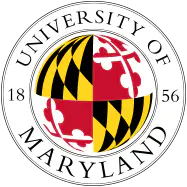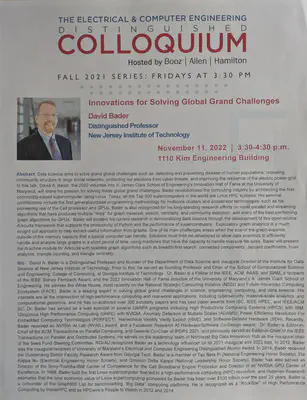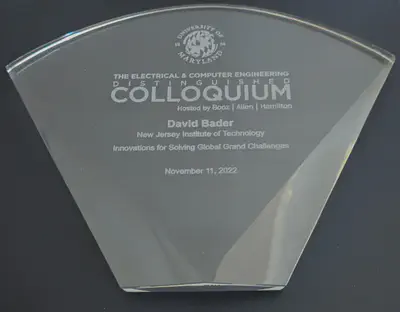University of Maryland ECE Booz Allen Hamilton Distinguished Colloquium: Innovations for Solving Global Grand Challenges

Abstract
Data science aims to solve grand global challenges such as: detecting and preventing disease in human populations; revealing community structure in large social networks; protecting our elections from cyber-threats, and improving the resilience of the electric power grid. In this talk, David A. Bader, the 2022 inductee into A. James Clark School of Engineering’s Innovation Hall of Fame at the University of Maryland, will share his passion for solving these global grand challenges. Bader revolutionized the computing industry by architecting the first commodity-based supercomputer using Linux. Today, all the Top 500 supercomputers in the world are Linux HPC systems. His seminal contributions include the first general-purpose programming methodology for multicore clusters and accelerator technologies, such as his pioneering use of the Cell processor and GPUs. Bader is also recognized for his long-standing research efforts on novel parallel and streaming algorithms that have produced multiple “firsts” for graph traversal, search, centrality, and community detection, and many of the best-performing graph algorithms for GPUs. Bader will present his current research in democratizing data science through the development of this open-source Arkouda framework that supports the productivity of Python and the performance of supercomputers. Exploratory graph analytics is a much sought out approach to help extract useful information from graphs. One of its main challenges arises when the size of the graph expands outside of the memory capacity that a typical computer can handle. Solutions must then be developed to allow data scientists to efficiently handle and analyze large graphs in a short period of time, using machines that have the capacity to handle massive file sizes. Bader will present the Arachne module for Arkouda with scalable graph algorithms such as breadth-first search, connected components, Jaccard coefficients, truss analytics, triangle counting, and triangle centrality.


Brief Biography:
David A. Bader is a Distinguished Professor and founder of the Department of Data Science and inaugural Director of the Institute for Data Science at New Jersey Institute of Technology. Prior to this, he served as founding Professor and Chair of the School of Computational Science and Engineering, College of Computing, at Georgia Institute of Technology. Dr. Bader is a Fellow of the IEEE, ACM, AAAS, and SIAM; a recipient of the IEEE Sidney Fernbach Award; and the 2022 Innovation Hall of Fame inductee of the University of Maryland’s A. James Clark School of Engineering. He advises the White House, most recently on the National Strategic Computing Initiative (NSCI) and Future Advanced Computing Ecosystem (FACE). Bader is a leading expert in solving global grand challenges in science, engineering, computing, and data science. His interests are at the intersection of high-performance computing and real-world applications, including cybersecurity, massive-scale analytics, and computational genomics, and he has co-authored over 300 scholarly papers and has best paper awards from ISC, IEEE HPEC, and IEEE/ACM SC. Dr. Bader has served as a lead scientist in several DARPA programs including High Productivity Computing Systems (HPCS) with IBM, Ubiquitous High Performance Computing (UHPC) with NVIDIA, Anomaly Detection at Multiple Scales (ADAMS), Power Efficiency Revolution For Embedded Computing Technologies (PERFECT), Hierarchical Identify Verify Exploit (HIVE), and Software-Defined Hardware (SDH). Recently, Bader received an NVIDIA AI Lab (NVAIL) award, and a Facebook Research AI Hardware/Software Co-Design award. Dr. Bader is Editor-in-Chief of the ACM Transactions on Parallel Computing, and General Co-Chair of IPDPS 2021, and previously served as Editor-in-Chief of the IEEE Transactions on Parallel and Distributed Systems. He serves on the leadership team of Northeast Big Data Innovation Hub as the inaugural chair of the Seed Fund Steering Committee. ROI-NJ recognized Bader as a technology influencer on its 2021 inaugural and 2022 lists. In 2012, Bader was the inaugural recipient of University of Maryland’s Electrical and Computer Engineering Distinguished Alumni Award. In 2014, Bader received the Outstanding Senior Faculty Research Award from Georgia Tech. Bader is a member of Tau Beta Pi (National Engineering Honor Society), Eta Kappa Nu (Electrical Engineering Honor Society), and Omicron Delta Kappa (National Leadership Honor Society). Bader has also served as Director of the Sony-Toshiba-IBM Center of Competence for the Cell Broadband Engine Processor and Director of an NVIDIA GPU Center of Excellence. In 1998, Bader built the first Linux supercomputer that led to a high-performance computing (HPC) revolution, and Hyperion Research estimates that the total economic value of Linux supercomputing pioneered by Bader has been over $100 trillion over the past 25 years. Bader is a cofounder of the Graph500 List for benchmarking “Big Data” computing platforms. He is recognized as a “RockStar” of High Performance Computing by InsideHPC and as HPCwire’s People to Watch in 2012 and 2014.
https://ece.umd.edu/news/story/ece-launches-14th-year-of-booz-allen-hamilton-colloquium-series